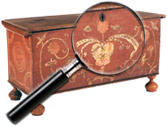The Ephrata Cloister or Ephrata Community
The Ephrata Cloister or Community was a religious community established in 1732 by Johann Conrad Beissel at Ephrata, in what is now Lancaster County, Pennsylvania.
The community was descended from the pietistic Schwarzenau Brethren movement of Alexander Mack of Schwarzenau in Germany. The first schism from the general body occurred in 1728 – the Seventh Day Dunkers, whose distinctive principle was that the seventh day was the true Sabbath.
In 1732, a semi-monastic community (the Camp of the Solitary) with a convent (the Sister House) and a monastery (the Brother House) was established at Ephrata, in what is now Lancaster County, Pennsylvania. The orders were celibate. In addition to celibacy, the members believed in strict interpretation of the Bible, and self-discipline. Members were required to sleep on wooden benches 15 inches wide, with wooden blocks for pillows. They slept six hours per night, from 9 P.M. to midnight, taking a break for two hours to “watch” for the coming of Christ, then sleeping from 2 A.M. until 5 A.M. They ate one small meal a day, and spent much time at work or praying privately. Services every Sunday were led by Beissel, often being several hours long.
Other believing families settled near the community, accepted Beissel as their spiritual leader and worshipped with them on the Sabbath. These families made an integral part to the cloister, which could not be self-sustaining without them. The brothers and sisters of Ephrata are famous for their writing and publishing of hymns, and the composition of tunes in four voices. Beissel served as the community’s composer as well as spiritual leader, and devised his own system of composition. The Ephrata hymnal (words only) was printed in 1747.
The charismatic figure Beissel died in 1768 and this contributed to a declining membership. The monastic feature was gradually abandoned, with the last celibate member dying in 1812 or 1813. In 1814 the Society was incorporated as the Seventh Day German Baptist Church (or The German Religious Society of Seventh Day Baptists). This church continued until 1934. Seven years later, a 28 acre tract of land with remaining buildings was conveyed to the Commonwealth of Pennsylvania for use as a state historical site.
The Ephrata Community can be toured today. It is administered by the Pennsylvania Historical & Museum Commission. Recorded versions of the community’s music is played for interested visitors. At its height, the community grew to 250 acres inhabited by about 80 celibate men and women.
